
New Features!
You can now save favorite things to do and places to visit, build your own trip itineraries and have everything you love about the Garden State — all in one place — with a MY VISITNJ page.
As you navigate through the site, click on the little “heart” icons to save Favorites, or click the “map” icons to save items to your trip itinerary.
At any point you can view your Favorites or manage your Itineraries by clicking “Account” in the header to return to your dashboard.
- Search NJ.gov

- eNEWSLETTER SIGN UP
- TRAVEL PLANNING RESOURCES
- Attractions
- Arts & Culture
- Casinos & Gaming
- Dining & Entertainment
- Outdoors & Sports
- Arts & Crafts
- Beer & Wine Tastings
- Children's Events
- Concerts & Music Events
- Multicultural
- Sports Events
- All Beaches
- Central Jersey
- Delaware River
- Greater Atlantic City
- Southern Shore
- Bed & Breakfasts
- Campgrounds & RV Parks
- Itineraries
- Beer, Wine & Spirits
- Hotels & Lodging
Coronavirus (COVID-19) Information and Resources Login or Register to save this to your Favorites.
Updated: 1/12/2022.
The New Jersey Division of Travel and Tourism (NJTT) is actively managing developments as they unfold with COVID-19, in close conjunction with the New Jersey Department of Health . The health and safety of our communities remain our top priority, and we advise all travelers, residents and businesses to seek official information regarding New Jersey’s response to the coronavirus at New Jersey’s COVID-19 Information Hub . The COVID-19 Info Hub also provides the very latest guidance on protocols, rules and details for safe gatherings in New Jersey. In addition, the New Jersey Department of Health's website offers residents and tourists the latest news and information in travel updates.
Latest COVID-19 News:
- Dec. 6, 2021 : Starting Dec. 6, all inbound international air passengers, regardless of vaccination status, must show a negative COVID-19 test taken no more than one day before travel to the United States. This mandate does not affect domestic flights. More information and details on this international mandate can be found at the CDC .
- Nov. 8, 2021: White House Press Secretary Kevin Munoz reported that inbound international travel restrictions to the U.S. will be lifted, immediate today, for fully vaccinated international travelers. This announcement includes the more than two dozen countries that were barred from U.S. entry since the start of the pandemic. Additionally, travelers to the U.S. by air will be subject to the presentation of a negative COVID-19 test to gain entry into the U.S. Those individuals traveling across land borders into the U.S. do not need to present a negative COVID-19 test to gain entry into the country.
- Oct. 15, 2021 : White House Press Secretary Kevin Munoz reported that inbound international travel restrictions to the U.S. will be lifted on Nov. 8, 2021 for fully vaccinated international travelers. This announcement includes the more than two dozen countries that were barred from U.S. entry since the start of the pandemic. Additionally, travelers to the U.S. by air will be subject to the presentation of a negative COVID-19 test to gain entry into the U.S. Those individuals traveling across land borders into the U.S. do not need to present a negative COVID-19 test to gain entry into the country.
- July 28, 2021 : New Jersey Gov. Phil Murphy and NJDOH Commissioner Judith Persichilli both announced the recommendation that both vaccinated and unvaccinated state residents wear masks in indoor settings when there is increased risk of transmission of COVID-19.
- July 27, 2021 : The CDC announced that fully vaccinated Americans may still be contagious and able to spread the Delta Variant of the COVID-19 virus; therefore, the CDC now urges vaccinated Americans, as well the those who are unvaccinated, to wear masks indoors in areas most impacted by high transmission rates of the Delta Variant.
- May 19, 2021 : The Murphy administration has announced "Operation Jersey Summer," aimed at getting as many New Jerseyans ages 12+ vaccinated against COVID-19. Breweries, wineries and state parks from all around the state are participants in the program, providing incentives for vaccinations. To learn more, please visit Operation Jersey Summer .
- May 17, 2021 : New Jersey Gov. Phil Murphy today announced the lifting of New Jersey’s travel advisory, which outlined quarantine and testing recommendations for residents and visitors to the state following interstate travel. Effective immediately, the travel advisory is no longer in place for both vaccinated and unvaccinated individuals. Residents and travelers are encouraged to follow the Centers for Disease Control and Prevention’s (CDC) protocols regarding quarantine and testing following domestic travel. Travelers should remain up to date regarding local travel recommendations and requirements applicable to their destination. International travel is still governed by the CDC’s protocols and guidance . New Jersey's Travel FAQ provides answers to many commonly asked travel questions.
Important Information:
- Executive Order No. 253 : Effective Aug. 23, 2021, this order requires all N.J. state employees and school personnel to by fully vaccinated against COVID-19 by Oct. 18, 2021 or be subject to COVID-19 testing one-two times per week.
- Executive Order No. 280 : Effective Jan. 11, 2022, this order declares a Public Health Emergency and restates the existing State of Emergency across all 21 counties in New Jersey, allowing state agencies and departments to utilize state resources to assist the State’s healthcare system and affected communities responding to and recovering from COVID-19 cases. Executive Order No. 281 continues Executive Orders Nos. 111, 112, and 207, allows Executive Orders Nos. 251, 252, 253, 264, and 271 to remain in effect, and extends various regulatory actions taken by the departments in response to COVID-19.
NJTT is committed to ensuring the safety and health of our residents, partners, tourists, visitors and staff, and will provide you with tourism-related updates, as we closely monitor the COVID-19 outbreak in our state and throughout the country.
- Center for Disease Control and Prevention (CDC): Coronavirus Disease
- World Health Organization: Coronavirus
- U.S. Travel Association - Emergency Preparedness and Response
- New Jersey COVID-19 Information Hub
- State of New Jersey: Department of Health
- New Jersey Businesses Guidance for COVID-19
- NJEDA COVID-19 Business Support
- U.S. Chamber of Commerce
- NJ Reopening Guidelines for Organizations
Have general questions about COVID-19? The NJ Poison Control Center and 211 have partnered with the State to provide information to the public on COVID-19:
- Call (General COVID-19 Questions): 2-1-1 (7 am – 11 pm)
- Call (Clinical Questions): 1-800-962-1253 (24/7)
- Text NJCOVID to 898-211 to receive alerts
- Text your zip code to 898-211 for live text assistance
Official Site of The State of New Jersey
The State of NJ site may contain optional links, information, services and/or content from other websites operated by third parties that are provided as a convenience, such as Google™ Translate. Google™ Translate is an online service for which the user pays nothing to obtain a purported language translation. The user is on notice that neither the State of NJ site nor its operators review any of the services, information and/or content from anything that may be linked to the State of NJ site for any reason. - Read Full Dislaimer
- Search close
Governor Phil Murphy

Updated Quarantine Advisory Issued for Individuals Traveling to New Jersey, Bringing New Total to 43 States and Territories
43 States and Territories Include Alabama, Alaska, Arizona, Arkansas, California, Colorado, Florida, Georgia, Guam, Iowa, Idaho, Indiana, Illinois, Kansas, Kentucky, Louisiana, Maryland, Massachusetts, Michigan, Minnesota, Missouri, Mississippi, Montana, North Carolina, North Dakota, Nebraska, New Mexico, Nevada, Ohio, Oklahoma, Oregon, Puerto Rico, Rhode Island, South Carolina, South Dakota, Tennessee, Texas, Utah, Virginia, Wisconsin, West Virginia, Washington and Wyoming New Jersey Highly Discourages, to the Extent Practical, Non-Essential Interstate Travel Given Increased Spread of the Virus Nationwide TRENTON – Today, Governor Phil Murphy advised individuals traveling to New Jersey from states or territories with significant community spread of COVID-19 to quarantine for a 14-day period from the time of last contact within the identified state or territory. The updated advisory includes the addition of Oregon and Washington, bringing the total to 43 states and territories. The travel advisory applies to any person arriving from a state or territory with a positive test rate higher than 10 per 100,000 residents or a state with a 10 percent or higher positivity rate over a 7-day rolling average. As of Wednesday, November 4, there are currently 43 states and territories that meet the criteria stated above: Alabama; Alaska; Arizona; Arkansas; California; Colorado; Florida; Georgia; Guam; Iowa; Idaho; Indiana; Illinois; Kansas; Kentucky; Louisiana; Maryland; Massachusetts; Michigan; Minnesota; Missouri; Mississippi; Montana; North Carolina; North Dakota; Nebraska; New Mexico; Nevada; Ohio; Oklahoma; Oregon; Puerto Rico; Rhode Island; South Carolina; South Dakota; Tennessee; Texas; Utah; Virginia; Wisconsin; West Virginia; Washington; and Wyoming.
Neighboring states Connecticut, Pennsylvania, and Delaware now meet the criteria for New Jersey’s travel advisory. Due to the interconnected nature of the region and mode of transport between New Jersey and the three states, a 14-day quarantine is not reasonable in all instances. Non-essential travel to and from these states, however, is highly discouraged at this time. Connecticut is also discouraging non-essential travel to and from New Jersey, but are not mandating that travelers quarantine due to the interconnected nature of the region and economy. Massachusetts will be included on New Jersey's advisory, but not Connecticut’s based on the same criteria.
“As a second wave of COVID-19 has begun across the nation and our state, we must do everything possible to stop the further spread of COVID-19.” said Governor Murphy. “It remains our top priority to ensure the safety of New Jersey residents, and we ask individuals arriving from these 43 states to get tested for COVID-19 and self-quarantine for 14 days.” Travelers and those residents who are returning from impacted states should self-quarantine at their home, hotel, or other temporary lodging. Individuals should leave the place of self-quarantine only to seek medical care/treatment or to obtain food and other essential items. It is expected that individuals will follow the public health advisory to self-quarantine. The list of states will be updated on a rolling basis and is accessible here .
Update May 10, 2024
Information for u.s. citizens in the middle east.
- Travel Advisories |
- Contact Us |
- MyTravelGov |
Find U.S. Embassies & Consulates
Travel.state.gov, congressional liaison, special issuance agency, u.s. passports, international travel, intercountry adoption, international parental child abduction, records and authentications, popular links, travel advisories, mytravelgov, stay connected, legal resources, legal information, info for u.s. law enforcement, replace or certify documents.
Share this page:
Learn about your destination
Take 90 seconds for safer travel.
Travel Advisory Levels
Enroll in step.

Subscribe to get up-to-date safety and security information and help us reach you in an emergency abroad.
Recommended Web Browsers: Microsoft Edge or Google Chrome.
External Link
You are about to leave travel.state.gov for an external website that is not maintained by the U.S. Department of State.
Links to external websites are provided as a convenience and should not be construed as an endorsement by the U.S. Department of State of the views or products contained therein. If you wish to remain on travel.state.gov, click the "cancel" message.
You are about to visit:

Search for COVID-19 Information Here

Are there travel restrictions to or from New Jersey?
As of May 11th, 2023, the federal public health emergency for COVID-19 has ended. There are no longer COVID-19 vaccination or testing requirements to enter the United States or New Jersey.
Recommendations for Travelers
All travelers are encouraged to follow travel recommendations from the CDC. International travelers must also follow federal requirements, summarized below.
The CDC recommends delaying travel until you are up to date with your COVID-19 vaccines. Before traveling internationally, check the COVID-19 situation in your destination country and follow any requirements at your destination , including mask wearing, proof vaccination, testing, or quarantine.
Do not travel if you tested positive for COVID-19 or have been recommended to isolate .
In New Jersey, face masks are no longer required in most outdoor and indoor settings. The Department of Health recommends wearing a face mask whenever you have symptoms of COVID-19, tested positive, were recently exposed to someone with COVID-19, or live in a county with elevated or "high" COVID community levels.
Travelers leaving New Jersey should check with the travel destination and transportation carrier (i.e., airline, cruise ship, etc.) to see if there are any additional health and safety protocols or requirements. In addition, travelers should also check with their employers, schools, and other entities that may have quarantine policies for individuals returning from travel.
For more information, refer to the CDC's guidance for domestic travel , the CDC's guidance for international travel or the NJ Department of Health's travel page .
Stay up to date with the latest COVID-19 news and updates from the State of New Jersey.
Travel Advisories
Whether due to accidents or inclement whether, travel delays are bound to happen sometimes. So before leaving the house, check the service advisories below to see if you need to make alternate travel plans.
NJ Transit Bus
There are no service advisories at this time

New Jersey Travel Advisory
Latest Update from NJ DOH 2/4/22
As of May 17, 2021, New Jersey's travel advisory is no longer in effect.
All travelers are encouraged to follow travel recommendations from the CDC. International travelers must also follow federal requirements, summarized below. The CDC recommends delaying all domestic and international travel until you are fully vaccinated.
Travelers leaving New Jersey should check with the travel destination and transportation carrier (i.e., airline, cruise ship, etc.) to see if there are any additional health and safety protocols or requirements. In addition, travelers should also check with their employers, schools, and other entities that may have quarantine policies for individuals returning from travel. For example, schools are encouraged to have quarantine policies in place for students and staff.
Domestic Travel
For those traveling to or from New Jersey, domestic travel is considered to be any travel lasting 24 hours or longer to any U.S. states or territories other than Pennsylvania, New York, and Delaware.
The CDC recommends delaying travel until you are up to date with your COVID-19 vaccines.
Do NOT travel if you are sick, tested positive for COVID-19, are waiting for your test results, or had close contact with someone who has COVID-19 and are recommended to quarantine .
If you are NOT up to date with your COVID-19 vaccines, you should get tested 1-3 days before their trip and 3-5 days after travel. The CDC also recommends staying home and self-quarantining for 5 days after domestic travel.
If you are up to date on your COVID-19 vaccines or if you have recovered from COVID-19 in the past 3 months, you do not need to get tested or self-quarantine after travel. However, the CDC recommends self-monitoring for COVID-19 symptoms, and isolating and getting tested if you develop symptoms.
Wearing a mask over your nose and mouth is required on planes, buses, trains, and other forms of public transportation traveling into, within, or out of the United States and while indoors at U.S. transportation hubs such as airports and stations.
For more information, refer to the CDC's guidance for domestic travel or the NJ Department of Health's travel page .
International Travel
The CDC recommends delaying travel until you are up to date with your COVID-19 vaccines. Before traveling internationally, check the COVID-19 situation at your destination and follow any requirements at your destination , including mask wearing, proof vaccination, testing, or quarantine.
If you are NOT vaccinated or NOT up to date with your COVID-19 vaccines, the CDC recommends a viral test 1-3 days before your trip.
All air passengers two years of age or older, regardless of vaccination status, must show a negative COVID-19 test taken no more than 1 day before boarding a flight from a foreign country to the United States. If you recently recovered from COVID-19, you may instead travel with proper documentation of recovery from COVID-19 .
If you are not a U.S. citizen, U.S. national, lawful permanent resident, or immigrant, you must be fully vaccinated to travel to the United States by plane. Limited exceptions apply.
After arrival to the United States, all travelers should get tested with a COVID-19 viral test 3-5 days after travel, self-monitor for COVID-19 symptoms, and isolate and get tested if they develop symptoms. If you are NOT vaccinated or NOT up to date with your COVID-19 vaccines, you should stay home and self-quarantine for a full 5 days after travel.
For more information, refer to the CDC's guidance for international travel or the NJ Department of Health's travel page .
Testing and Vaccination
COVID-19 testing is available to everyone in New Jersey. You don't need insurance and free testing is available. Visit covid19.nj.gov/testing to find a testing location near you or order a free at-home testing kit.
Everyone 5 years or older is eligible for a COVID-19 vaccine in New Jersey and encouraged to get vaccinated as soon as possible. To learn more about where to get vaccinated, visit covid19.nj.gov/vaccine
If you're already vaccinated, get a booster. Studies show immunity wanes over time with COVID-19 vaccines, increasing the risk of getting a breakthrough infection and spreading it to others. To protect yourself and your loved ones, get a booster shot at any vaccination location. Learn more.
Exploring The Jersey Shore: Can Florida Residents Travel To New Jersey?
- Last updated May 13, 2024
- Difficulty Advanced
- Category Travel
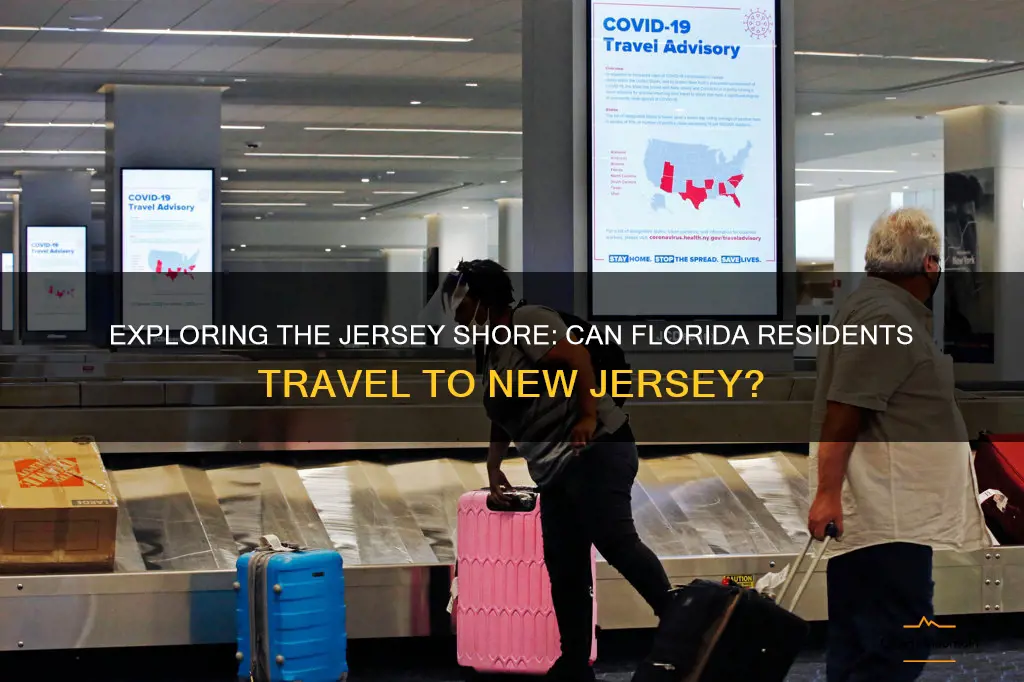
Are you a Florida resident dreaming of a vacation along the iconic Jersey Shore? Well, you're not alone! Many Floridians are curious about whether they can travel to New Jersey and experience all the beauty and excitement the east coast has to offer. In this article, we will explore the current travel restrictions and guidelines for Florida residents looking to visit the Jersey Shore. So grab your beach towel and get ready to dive into the details of this potential summer adventure!
What You'll Learn
Florida residents' travel restrictions to new jersey, covid-19 guidelines for florida residents in new jersey, requirements for florida residents traveling to new jersey, traveling from florida to new jersey: what to know.

Due to the ongoing COVID-19 pandemic, travel restrictions and guidelines are constantly changing. If you are a Florida resident planning to travel to New Jersey, it is important to stay updated on the latest regulations. Here is what you need to know:
- Travel Advisory: As of September 2021, there is no mandatory quarantine or testing requirement for travelers coming to New Jersey from Florida. However, it is still advisable to stay informed about any changes in the travel advisory issued by the Department of Health.
- Check for Updates: Before planning your trip, it is crucial to regularly check for any updates or changes in travel restrictions. These changes can be sudden, so it is wise to stay informed through official government websites or reliable sources.
- COVID-19 Precautions: Regardless of the travel restrictions, it is essential to follow proper COVID-19 safety precautions during your journey. This includes wearing a mask, practicing social distancing, and frequently sanitizing your hands. These measures not only protect you but also contribute to the overall safety of others around you.
- Local Regulations: Although there might not be specific travel restrictions from Florida to New Jersey, it is important to familiarize yourself with any local regulations in the areas you plan to visit. Some cities or counties in New Jersey might have their own guidelines or restrictions in place, so make sure to check their official websites for the latest information.
- Travel Insurance: Given the unpredictable nature of the pandemic, it is advisable to consider purchasing travel insurance. This will help protect you financially if your trip gets canceled or if you face any unforeseen circumstances related to COVID-19.
- Plan Ahead: Even though there might not be stringent restrictions, it is still important to plan your trip in advance. This includes booking accommodations, transportation, and any necessary reservations for attractions or activities. Many establishments might have limited capacity or require advanced booking due to social distancing guidelines, so it is best to plan accordingly.
- Stay Flexible: With the ever-changing situation, it is crucial to remain flexible with your travel plans. Be prepared for potential disruptions or changes and have backup options available. This could involve having alternative dates or destinations in mind in case your original plans need to be adjusted.
Remember, the situation can change rapidly, so it is essential to stay informed and follow the guidance of health officials. By doing so, you will ensure a safe and enjoyable trip while minimizing the risk of spreading or contracting COVID-19.
Essential Tips for Safely Traveling with a Medium-Sized Pet Carrier during Emergency Situations
You may want to see also
With the ongoing COVID-19 pandemic, it is important for travelers to stay updated on the guidelines and restrictions in place for their destination. If you are a Florida resident planning to travel to New Jersey, here are some of the guidelines you should be aware of:
Travel Advisory:
New Jersey currently has a travel advisory in place for individuals traveling from certain states, including Florida. This means that travelers from Florida are strongly advised to self-quarantine for 14 days upon arrival in New Jersey.
Quarantine Requirements:
During the 14-day quarantine period, it is recommended that you stay at home or in a hotel room and avoid contact with others as much as possible. This is to reduce the risk of potential transmission of the virus. It is important to note that the quarantine period can be shortened if you obtain a negative COVID-19 test result after being in New Jersey for at least 7 days.
COVID-19 Testing:
If you are a Florida resident planning to travel to New Jersey, it is advisable to get tested for COVID-19 before your trip. This will help minimize the risk of spreading the virus. Make sure to check with the testing facilities and laboratories in your area for the availability and requirements for COVID-19 testing.
Face Mask Mandate:
Wearing a face mask is mandatory in New Jersey, both indoors and outdoors, in public places where social distancing is not possible. It is important to bring an adequate supply of face masks for your trip and wear them properly to protect yourself and others.
Social Distancing:
Maintaining a distance of at least six feet from others is recommended in New Jersey. Whether you're at the airport, in public places, or visiting attractions, it is important to practice social distancing to minimize the risk of transmission.
Check Local Regulations:
It is crucial to stay informed about any local regulations or restrictions that may be in place during your stay in New Jersey. This includes checking for any changes in guidelines, travel restrictions, or closures of attractions or businesses due to the pandemic. Local health department websites and official government sources are the best places to find up-to-date and accurate information.
In conclusion, if you are a Florida resident planning to travel to New Jersey, it is important to adhere to the COVID-19 guidelines and restrictions in place. This includes self-quarantining for 14 days upon arrival, getting tested before your trip, wearing a face mask, practicing social distancing, and staying informed about local regulations. By following these guidelines, you can help protect yourself and others during your visit to New Jersey.
Exploring the Travel Cap in London: Everything You Need to Know
If you are a Florida resident planning to travel to New Jersey, it is important to familiarize yourself with the requirements and guidelines set by the state. New Jersey has specific regulations in place for out-of-state travelers, which are subject to change depending on the current public health situation. This article will outline the current requirements for Florida residents traveling to New Jersey.
- COVID-19 Testing: As of July 1, 2021, New Jersey does not require fully vaccinated individuals to get tested or self-quarantine before or after domestic travel, including Florida residents. However, it is always a good idea to stay updated on the latest guidelines, as they may change in response to the evolving pandemic situation.
- Vaccination Status: It is important to note that vaccination status may affect the requirements for travelers. If you are fully vaccinated, meaning you have received all necessary doses of an FDA-approved or authorized COVID-19 vaccine, you may not be subject to certain travel restrictions. However, it is still recommended to follow other preventive measures such as wearing masks and practicing social distancing.
- Face Mask Policy: New Jersey currently follows the CDC's recommendations regarding face masks. While traveling, it is advisable to wear masks in public spaces, including airports, train stations, and communal transportation. Make sure to pack an adequate supply of masks for your trip.
- State-to-State Variants: It is essential to stay informed about any travel advisories or restrictions specific to Florida. Certain states may have travel restrictions or quarantine requirements based on high COVID-19 transmission rates or the presence of new variants. Prior to your trip, check both New Jersey and Florida's official government websites and health department resources for the most up-to-date information.
- Public Health Protocols: Regardless of your vaccination status, it is important to practice general safety measures to prevent the spread of COVID-19. Wash your hands frequently, use hand sanitizer when soap and water are not available, avoid close contact with sick individuals, and cover your mouth and nose when coughing or sneezing.
- Transportation Options: Plan your trip ahead of time and be aware of any restrictions or guidelines set by airlines, bus companies, or other transportation providers. Some airlines may require passengers to present proof of vaccination or a negative COVID-19 test result taken within a certain time frame before boarding. Ensure that you comply with all requirements and have the necessary documentation to avoid any inconveniences.
- Local Requirements: Once you arrive in New Jersey, familiarize yourself with any local requirements or regulations that may be in effect. These measures could include capacity restrictions, mask mandates, or guidelines for public spaces such as restaurants and attractions. Stay updated on any changes through official state and local government websites.
It is crucial to remember that the COVID-19 pandemic is an ever-evolving situation. Before traveling, it is advisable to closely monitor official sources of information, such as the Centers for Disease Control and Prevention (CDC) and the New Jersey Department of Health, for the most up-to-date guidelines and requirements for travelers. By staying informed and following all necessary precautions, you can ensure a safe and enjoyable trip to New Jersey.

Preventing Food Spoilage: Essential Tips for Traveling with Perishable Items
If you are a Florida resident planning to travel to New Jersey, there are a few things you should know. Whether you are going for a vacation or a business trip, it is important to understand the current travel regulations, safety guidelines, and any specific requirements that may be in place due to the ongoing COVID-19 pandemic. Here is what you need to know before you go:
- Check the travel restrictions: It is crucial to stay informed about any travel restrictions or guidelines that may be in place before your trip. Monitor the official websites of the Centers for Disease Control and Prevention (CDC), as well as the respective state government websites of Florida and New Jersey, for the latest updates on travel restrictions, quarantine requirements, and COVID-19 testing protocols.
- Understand quarantine requirements: As of the time of writing, both Florida and New Jersey have lifted mandatory quarantine requirements for domestic travelers. However, if you are experiencing COVID-19 symptoms or have come into contact with someone who has tested positive, it is important to isolate and follow the recommendations of health authorities.
- Check specific county/city guidelines: While statewide restrictions may have been lifted, certain counties or cities within New Jersey may still have their own regulations in place. Make sure to research and follow any specific guidelines issued by the local authorities in the area you plan to visit.
- Follow safety guidelines: Regardless of travel regulations, it is crucial to follow basic safety guidelines to protect yourself and others from the spread of COVID-19. Wear a mask in public places, maintain social distancing, wash your hands regularly, and avoid crowded areas whenever possible. Adhering to these precautions can help minimize the risk of infection.
- Consider traveling by air: If you are flying from Florida to New Jersey, it is advisable to check with the airlines for any specific safety protocols they have implemented. Many airlines have enhanced cleaning procedures, reduced capacity, and require passengers to wear masks throughout the flight. Be prepared to follow these guidelines and make sure to pack a sufficient supply of masks for your journey.
- Be aware of hotel and accommodation protocols: If you plan to stay in a hotel or other accommodation, verify their COVID-19 safety protocols and cleanliness standards. Many establishments have implemented enhanced cleaning procedures to ensure the safety of their guests. Consider booking accommodations that offer contactless check-in options and follow rigorous cleaning practices.
- Stay informed about local attractions and services: Before your trip, research the current status and availability of attractions, restaurants, and other services at your destination in New Jersey. Some attractions may have reduced capacity or require advance reservations due to social distancing requirements. It is always a good idea to make arrangements in advance to avoid any disappointment or inconvenience during your visit.
Traveling from Florida to New Jersey can be an exciting and rewarding experience, but it is essential to prioritize safety and follow the guidelines in place. Stay informed, take necessary precautions, and enjoy your time in the Garden State.
Are Travelers Checks Considered Money for International Travel?
Frequently asked questions.
Yes, Florida residents can travel to New Jersey. There are no travel restrictions or quarantine requirements for Florida residents entering New Jersey.
Currently, Florida residents do not need to show proof of vaccination to travel to New Jersey. However, it is recommended to check the latest travel guidelines and requirements before your trip.
As of now, Florida residents do not need to provide a negative COVID-19 test result before traveling to New Jersey. However, it is advised to stay updated on any changes to travel restrictions or requirements.

- Alain Brady Author Reviewer

- Viajera Compulsiva Author Editor Reviewer
It is awesome. Thank you for your feedback!
We are sorry. Plesae let us know what went wrong?
We will update our content. Thank you for your feedback!
Leave a comment
Travel photos, related posts.

Reporting Process for IRS Travel Reimbursement Checks: What You Need to Know
- May 11, 2024

Can I Travel to Croatia with a Schengen Visa?
- Mar 21, 2024

Can You Travel with a Spouse Visa? Everything You Need to Know
- Mar 31, 2024

Best Destinations for Solo Travel in January
- May 08, 2024

Exploring the Dimensions of the Eagle Creek Travel Gear: What You Need to Know

Unveiling the Rating System for Girls Travel Basketball Teams: Insights and Analysis
- May 10, 2024
U.S. reissues Level 2 travel warning for Germany. Here’s what you need to know before your next trip
- Updated: May. 04, 2024, 10:10 a.m. |
- Published: May. 04, 2024, 10:00 a.m.

The U.S. State Department has reissued a Level 2 travel advisory for Germany due to fears of terrorism. AP
- Katherine Rodriguez | NJ Advance Media for NJ.com
The U.S. State Department has reissued a Level 2 travel advisory for Germany due to fears of terrorism.
The State Department issued the advisory on Wednesday, ranking the travel advisory on a scale of two out of four. This means that those traveling to an area must “exercise increased caution.”
“Terrorists may attack with little or no warning,” the State Department noted.
The agency added that terrorists could target tourism and transportation hubs, as well as shopping destinations, hotels, clubs, restaurants, local government facilities and major events.
The State Department noted on its website that for those who do decide to travel to Germany, travelers should pay attention to their surroundings , follow the instructions of local authorities, be aware of the latest breaking news in the area and adjust your plans, if necessary. The organization also urges travelers to Germany to create a contingency plan for emergency situations as well as sign up for the Smart Traveler Enrollment Program ( STEP ) to receive alerts and make it easier for the State Department to locate you in case of an emergency.
The U.S. Department of State has issued several travel warnings this year with those most recently centered around the Caribbean.
One was a Level 4 “do not travel” warning against traveling to the country of Haiti due to kidnappings and gang violence.
Another warning from the State Department cautioned travelers to “reconsider travel” to the country of Jamaica after 65 people were murdered in one month.
Our journalism needs your support. Please subscribe today to NJ.com .
Katherine Rodriguez can be reached at [email protected] . Have a tip? Tell us at nj.com/tips .
If you purchase a product or register for an account through a link on our site, we may receive compensation. By using this site, you consent to our User Agreement and agree that your clicks, interactions, and personal information may be collected, recorded, and/or stored by us and social media and other third-party partners in accordance with our Privacy Policy.
- International

Trump's hush money trial

Israel-Hamas war
The latest on the massive solar storm
By Angela Fritz, Elise Hammond and Chris Lau, CNN
Incredible lighthouse picture from Maine
From CNN's Chris Lau
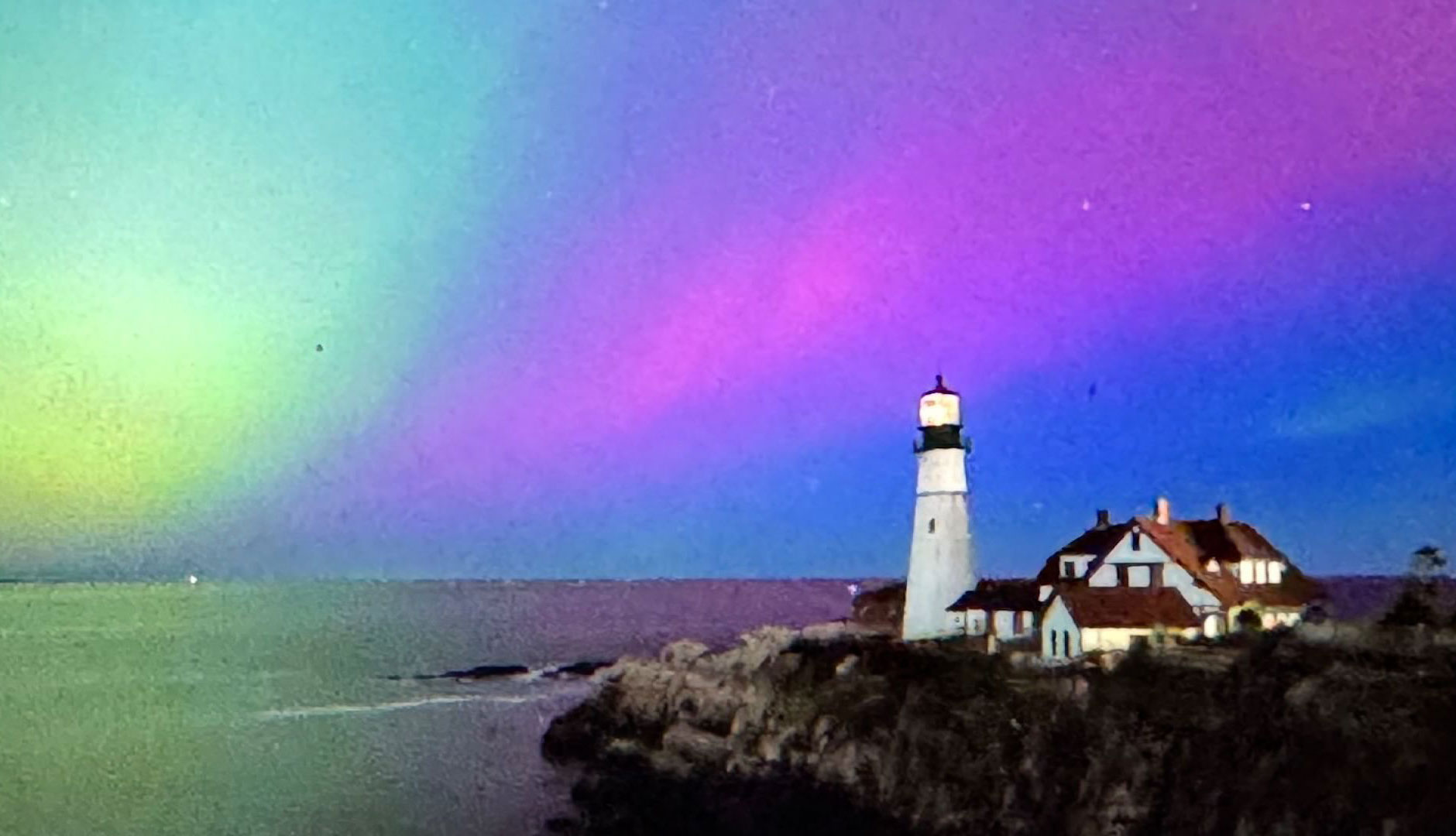
Among a flurry of surreal images capturing the dazzling auroras is one taken by Benjamin Williamson of a lighthouse in Portland, Maine.
"It's one of the most incredible things I've ever seen, the awe and wonder," Williamson told CNN.
He said he used a long-exposure technique to snap the shot, but did not edit it.
Watch the full interview with Williamson here .
Things could be about to ramp up
If you still haven't seen the aurora, hold on for another 30 minutes to an hour, according to CNN meteorologist Chad Myers.
The next wave of coronal mass ejections, or CMEs, which cause the aurora, is about to arrive, he said.
"Just wait a minute because things are going to start to ramp up here," he said, adding that the increase could arrive "anytime now." "When it comes, get outside, get ready, put your coat on."
For those who are too busy to witness the phenomenon tonight, Myers said the aurora is expected to last three nights.
Why does the aurora last for a weekend?
By CNN's Chris Lau
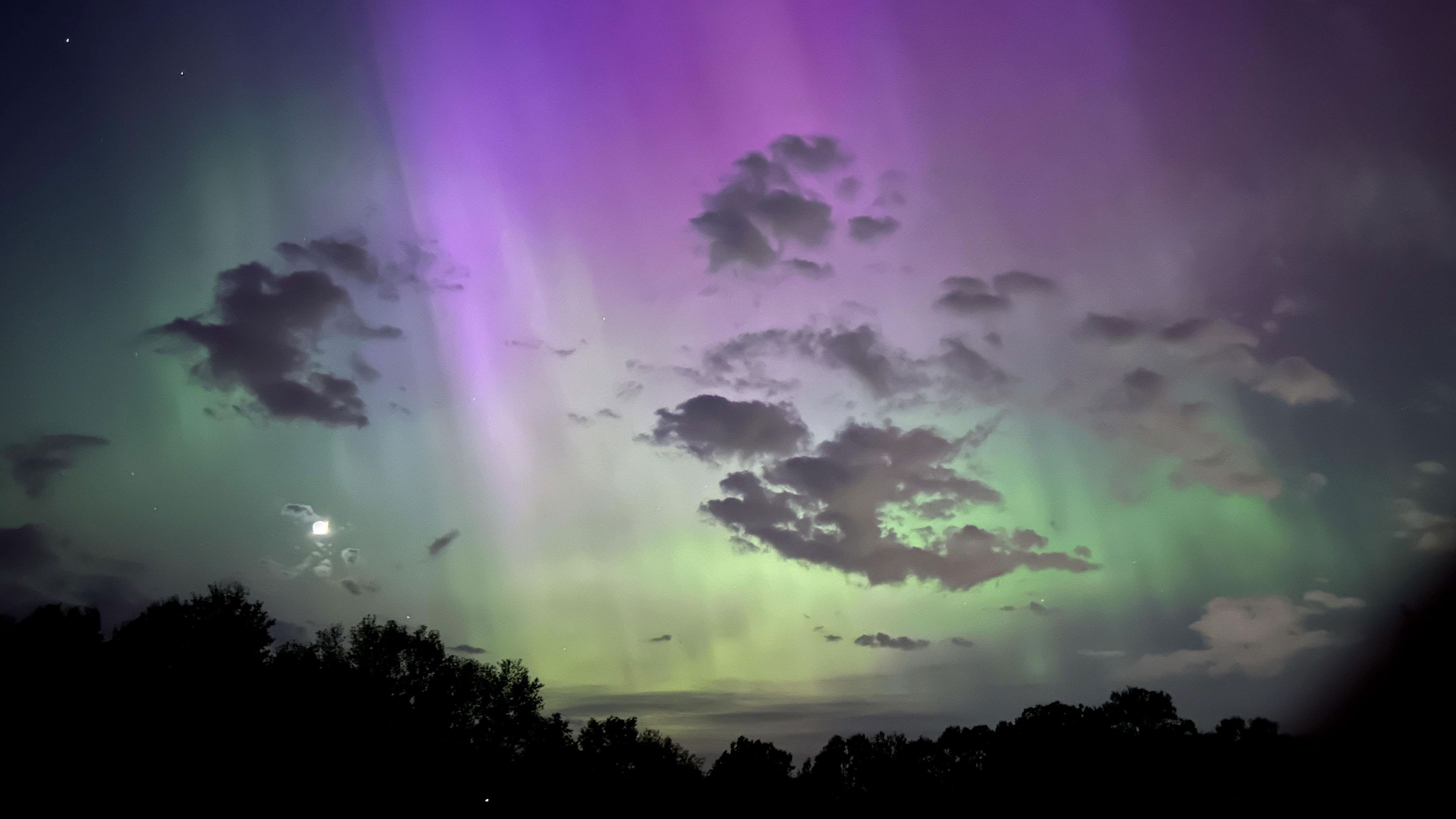
Generally, it takes just eight minutes for light to travel 93 million miles to the Earth from the sun, but astrophysicist Janna Levin said the energized particles causing the current wave of aurora travel a lot slower, causing the phenomenon to last for the weekend.
"Some of these mass ejections are trillions of kilograms," she said. "They're slower. So they're taking longer, but still hours, maybe tens of hours."
Here's how the solar storm looks in the South and on the East Coast
The aurora was visible across the East Coast and in the South Friday.
Here's how it looked in Chester, South Carolina.
Down in Florida, waves of color swam through the sky.
Up north in New Jersey, a purple-ish haze could be seen in the sky.
Will solar storms get more intense and risky in the future?
The answer is probably not in the short term, according to astrophysicist Hakeem Oluseyi.
He said scientists study what is constantly happening on the surface of the sun and have found a pattern.
“Geological data shows us that in the past the sun was way more active than it is today. It has cycles where it goes very quiet ... and you have events that show that the solar activity was much, much greater,” he told CNN. “So there's no evidence that we're going to see those big maxima this cycle."
But the astrophysicist also spoke of a caveat - the limitations of modern science.
“Even though it's predictable in the short term, we still don't quite understand what creates the magnetic fields in the sun,” he said, adding: “That's why NASA has so many satellites looking at the sun.”
In Pictures: Auroras light the sky during rare solar storm
From CNN Digital's Photo Team

A series of solar flares and coronal mass ejections from the sun are creating dazzling auroras across the globe .
The rare solar storm may also disrupt communications. The last time a solar storm of this magnitude reached Earth was in October 2003, according to the National Oceanic and Atmospheric Administration's Space Weather Prediction Center.
See more photos of the aurora from tonight.
Behind dazzling aurora could lie “real danger,” Bill Nye the Science Guy says

The massive solar storm could present “a real danger,” especially with the modern world relying so much on electricity, according to Bill Nye the Science Guy , a science educator and engineer.
Scientists are warning an increase in solar flares and coronal mass ejections from the sun have the potential to disrupt communication on Earth into the weekend. Solar flares can affect communications and GPS almost immediately because they disrupt Earth’s ionosphere, or part of the upper atmosphere. Energetic particles released by the sun can also disrupt electronics on spacecraft and affect astronauts without proper protection within 20 minutes to several hours.
In comparison to tonight's event, Nye drew comparisons with another incident in 1859, known as the Carrington Event, when telegraph communications were severely affected.
“The other thing, everybody, that is a real danger to our technological society, different from 1859, is how much we depend on electricity and our electronics and so on,” Nye said. "None of us really in the developed world could go very long without electricity."
He noted that there are systems in place to minimize the impact, but “stuff might go wrong,” stressing that not all transformers are equipped to withstand such a solar event.
“It depends on the strength of the event and it depends on how much of our infrastructures are prepared for this the sort of thing,” he said.

Bill Nye breaks down significance of the solar storm | CNN
This post has been updated with more details on solar flares' impact on electronics.
Here's where clouds will block the view of the northern lights in the US
From CNN's Angela Fritz
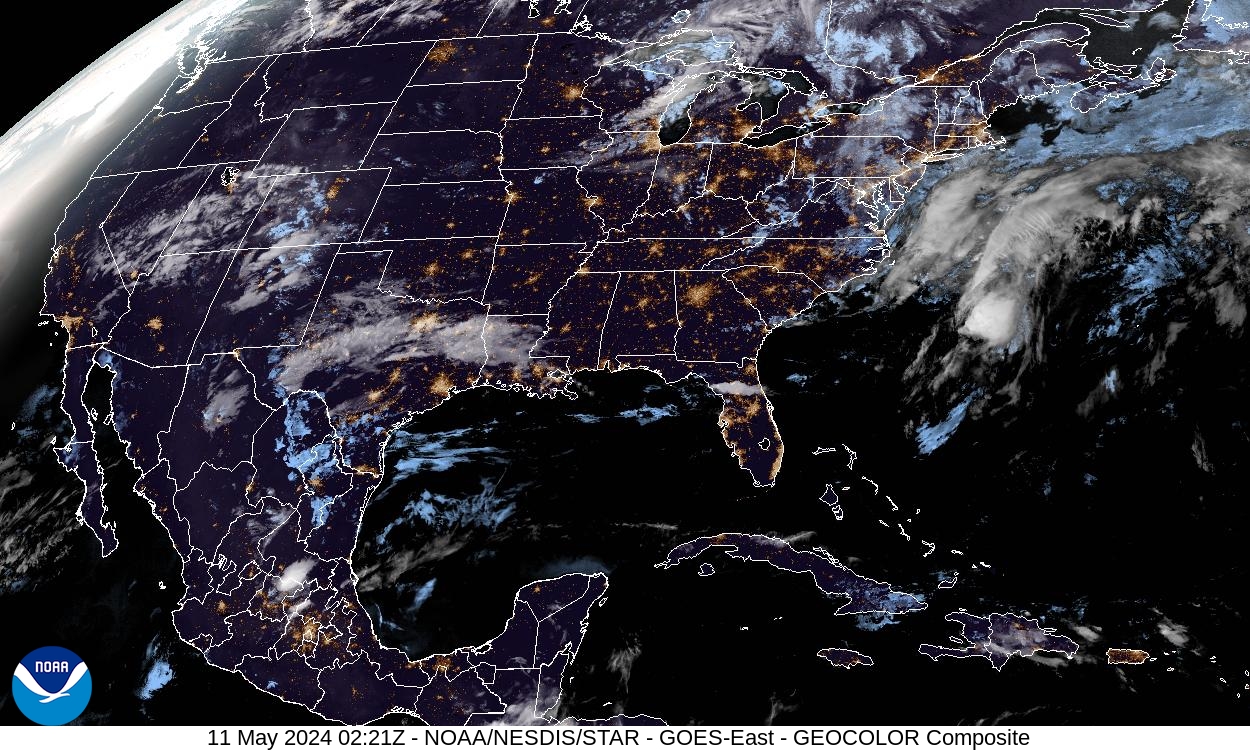
After an incredibly stormy week, most of the Lower 48 has clear skies to see the northern lights. But there are some areas where clouds and rainy weather are spoiling the view.
A deck of clouds is blocking the sky in the Northeast, from parts of Virginia into Maine, as an area of low pressure spins off the East Coast.
In the Midwest, the aurora will be hard to see through thick clouds in parts of Wisconsin, Michigan — including the Upper Peninsula — and Illinois.
A stripe of clouds is tracking across Texas, including Dallas-Forth Worth, and into Louisiana.
And in the Southwest, patchy clouds across the the Four Corners region could make the northern lights difficult to spot.
Aurora seen at least as far south as Georgia
Barely visible to the naked eye, the aurora can be seen in Atlanta in the 10 p.m. ET hour.
It is easier to see through photographs using a long exposure. The photos below, taken by CNN's Eric Zerkel and Emily Smith, used 3- and 10-second exposures.
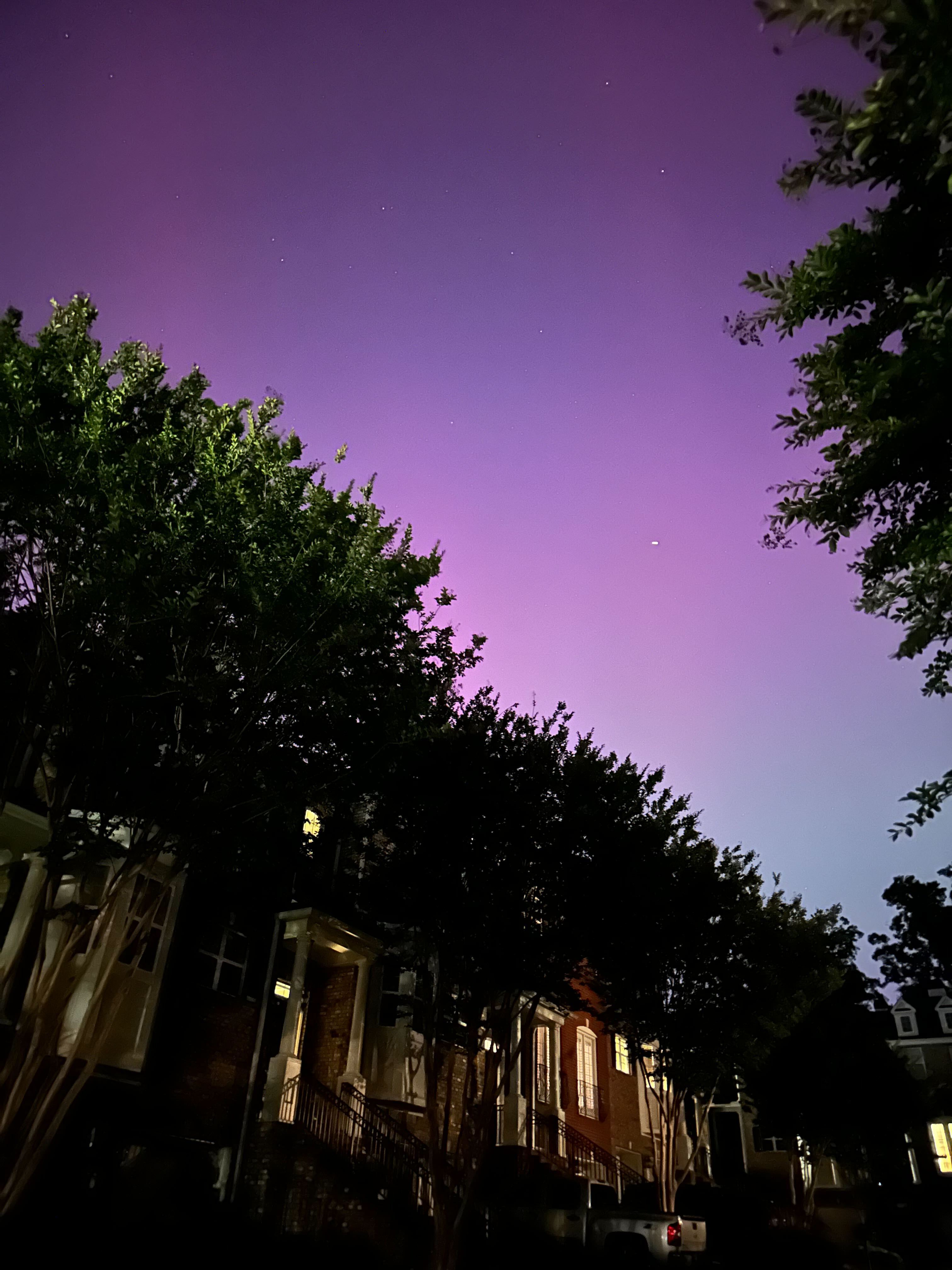
Please enable JavaScript for a better experience.
‘Extreme’ solar storm triggers Northern Lights as far south as Florida Friday
Skies across the u.s. lit in a spectacular colorful glow not seen in years to decades as massive solar flares slammed into earth on friday, triggering "extreme" levels of geomagnetic activity. and the show may not be over for a while..

Strongest solar action in a decade impacting Earth right now
Aurora viewers will want to keep their eyes to the sky this weekend as a solar flare from the Sun is impacting Earth right now. Current forecasts indicate this storm will continue into Saturday morning across North America.
Skies across the U.S. were lit in a spectacular, colorful glow at levels not seen in years or decades as massive solar flares slammed into Earth on Friday.
Northern Light displays, typically relegated to states along the Canadian border during a typical geomagnetic storm, reached as far as the Gulf Coast Friday night, with pink, green and purple skies reported in Florida, Texas and Alabama.
The SWPC says satellites observed conditions that reached level 5 on their 5-point scale of geomagnetic activity on Friday evening, noted as an "extreme" event and the first such storm to reach that level since October 2003. While conditions have since drifted back to a level 4 storm Saturday morning, more geomagnetic activity is heading Earth's way over the weekend from additional solar flares, possibly lasting into early next week.
NOAA observed yet another massive X-class solar flare released from the Sun on Friday evening, rating it as X5.4 on their scale, among the strongest flares of recent activity.

10 May 2024, Brandenburg, Sieversdorf: Light green and violet-reddish auroras glow in the night sky in the Oder-Spree district of East Brandenburg. The northern lights (aurora borealis) are produced by a cloud of electrically charged particles from a solar storm in the earth's atmosphere. (Photo by Patrick Pleul/picture alliance via Getty Images)

A brilliant display of the Aurora Australis (aka the "Southern Lights") over New Zealand as a severe geomagnetic storm reaches Earth on May 10, 2024. (@AndrewDickson13 via X)

Northern Lights from Missoula, Montana during an extreme geomagnetic storm on May 10, 2024. (NWS Missoula)

Northern Lights from Seattle during an extreme geomagnetic storm on May 10, 2024. (NWS Seattle)

Northern Lights from Great Falls, Montana during an extreme geomagnetic storm on May 10, 2024. (NWS Great Falls, Montana)

Northern Lights from Mukilteo, Washington during an extreme geomagnetic storm on May 10, 2024. (Scott Sistek)

10 May 2024, Baden-Württemberg, Freiburg: Northern lights appear over the Dreisamtal valley in the Black Forest near Freiburg. (Photo by Valentin Gensch/picture alliance via Getty Images)

Northern Lights from Shreveport, Louisiana during an extreme geomagnetic storm on May 10, 2024. (NWS Shreveport)

FOX Weather Storm Tracker Mark Sudduth caught a stunning view of the aurora over South Carolina while in a plane. (Mark Sudduth)

View from Concord, N.C. (Jay Caceres)

Outside of the NWS office in Caribou, Maine. ( )

Northern lights or aurora borealis illuminate the night sky over a camper's tent north of San Francisco in Middletown, California on May 11, 2024. The most powerful solar storm in more than two decades struck Earth, triggering spectacular celestial light shows from Tasmania to Britain -- and threatening possible disruptions to satellites and power grids as it persists into the weekend. (Photo by JOSH EDELSON / AFP) (Photo by JOSH EDELSON/AFP via Getty Images) ( )

Northern Lights from Reno, Nevada during an extreme geomagnetic storm on May 10, 2024. (NWS Reno)

Northern Lights from Riverton, Wyoming during an extreme geomagnetic storm on May 10, 2024. (NWS Riverton)

Northern Lights from Great Falls, Montana during an extreme geomagnetic storm on May 10, 2024. ( )

Northern Lights from Hastings, Nebraska during an extreme geomagnetic storm on May 10, 2024. (NWS Hastings)

Forecasters at the NWS office in Calera, AL saw the aurora and the space station. (@NWSBirmingham)

Clear skies led the Northern Lights to be visible in Texas and New Mexico (@NWSElPaso)

The aurora borealis, also known as the northern lights, glow on the horizon over Basingstoke in Hampshire. Picture date: Friday May 10, 2024. (Photo by Patrick Pleul/picture alliance via Getty Images)
SEE MORE: EXTREME GEOMAGNETIC STORM TRIGGERS JAW-DROPPING AURORAS AROUND THE WORLD
Aside from brilliant and widespread displays of the aurora, geomagnetic storms can impact infrastructure in near-Earth orbit and on Earth’s surface, potentially disrupting communications, the electric power grid, navigation, radio and satellite operations, the SWPC says. The last time Earth experienced a Level 5 geomagnetic event, there were power outages in Sweden and damaged transformers in South Africa.
THE HISTORY OF EARTH'S GREATEST SOLAR STORMS
"We have notified all of our infrastructure operators that we coordinate with, such as satellite operators, communication folks, and of course, the power grid here in North America," SWPC coordinator Shawn Dahl said Friday. "So they are able and prepared to take mitigation efforts as much as possible throughout this event if it should unfold to the levels that we currently are anticipating."
SpaceX's Starlink service warned on its website Saturday morning that it was experiencing "degraded service," though it didn't give further details. Yet SpaceX head Elon Musk had earlier posted on X that the Starlink satellites were under a lot of pressure due to the geomagnetic storm and were still holding up.
Massive sunspot 17 times the size of Earth creating multiple flares
Two massive sunspots have recently merged and spit out at least three X-class (largest) and several M-class (second-largest) solar flares . According to NOAA, the explosive acceleration of charged and superheated plasma, known as a coronal mass ejection or CME, speeds through space and expands.
The new sunspot is 17 times the diameter of the Earth.
"These two sunspot clusters are magnetically complex and much larger than Earth. Together they have been the source of frequent M-class flares (minor to moderate)," stated the Space Weather Prediction Center. "RGN 3664 (the combined sunspot region) continues to grow and increase in magnetic complexity and has evolved into a higher threat of increased solar flare risk."
NASA’s Solar Dynamics Observatory captured these images of the solar flares — as seen in the bright flashes in the left image (May 8 flare) and the right image (May 7 flare). The image shows a subset of extreme ultraviolet light that highlights the extremely hot material in flares and which is colorized in orange.
(NASA/SDO / NOAA)
Amid the multiple solar flares, NOAA space weather forecasters have observed at least seven CMEs from the sun, with the first impacts arriving early Friday afternoon ET. Heightened solar conditions are expected to persist perhaps as long as Sunday.
"This is an unusual and potentially historic event," the SPWC stated.
WHAT IS A GEOMAGNETIC STORM?
Another sunspot also released strong CMEs this week and continues to be active. According to NOAA, the bulk of five CMEs will collide with Earth in a glancing blow as early as midday Friday through Sunday.
How flares can set off geomagnetic storms
"Flares are when the sun brightens, and we see the radiation, and that's kind of the muzzle flash," explained Professor Peter Becker of George Mason University in an earlier interview. "And then the cannon shot is the coronal mass ejection (CME) . So, we can see the flash, but then the coronal mass ejection can go off in some random direction in space, but we can tell when they're actually going to head towards Earth. And that gives us about 18 hours of warning, maybe 24 hours of warning before those particles get to Earth and start messing with Earth's magnetic field."
SOLAR SUPERSTORM COULD ‘WIPE OUT THE INTERNET’ FOR WEEKS OR MONTHS, SCIENTIST SAYS

An illustration of Earth's magnetic field shielding our planet from solar particles.
(NASA/GSFC/SVS / NASA)
NOAA warns of a wide area blackout of high-frequency radio communications for hours. The geomagnetic storm could also cause widespread voltage irregularities in power systems, which trigger false alarms on security devices, cause drag on low earth orbit satellites preventing them from orienting and cause range errors and a loss-of-lock for GPS systems.
X-class solar flares are the largest explosions in the solar system. According to NASA, the biggest X-class flares can produce as much energy as 1 billion atomic bombs. M-class flares are the second-strongest flares, and they can cause minor radiation storms and harm astronauts.
Solar cycle peaking , making solar storms more plentiful
Tree rings and ice cores are evidence of much larger solar superstorms in the past.
In 1859, the great Carrington Event, generally regarded as Earth's greatest solar storm in recent history, covered nearly the entire planet in aurora. About 14,000 years ago, a solar flare, possibly hundreds of times stronger than the Carrington flare, impacted Earth.

Northern lights visible from Europe
Friday's aurora was visible across much of Europe. NOAA’s Space Weather Prediction Center classified the event as a G5, the highest level on its geomagnetic storm scale.
NOAA forecasts the current 11-year solar cycle to peak sometime in 2024 or early 2025, and solar activity is likely to remain active for the next several months or even a few years.
NOAA PREDICTS STRONGER PEAK OF SOLAR ACTIVITY IN 2024 THAN ORIGINALLY ANTICIPATED
- Earth & Space
- Space Weather
- Pennsylvania
- New England
- North Dakota
- South Dakota

IMAGES
COMMENTS
Travel Alerts. The New Jersey Turnpike Authority is dedicated to the safe and efficient movement of people and goods over two of the busiest toll roads in the United States - the New Jersey Turnpike and the Garden State Parkway. The Authority's highways are a critical link in the transportation network of the Northeast I-95 Corridor.
Travel Alerts and Advisories - NJ TRANSIT ... undefined
The app uses the phone's internal GPS to locate your position and direction of travel. SafeTripNJ will sense when you are approaching a reported roadway conditions weather on the New Jersey Turnpike, Garden State Parkway, New Jersey Interstate or New Jersey highway. It will start talking with streaming audio, telling you about active advisories ...
05/17/2021. TRENTON - Governor Phil Murphy today announced the lifting of New Jersey's travel advisory, which outlined quarantine and testing recommendations for residents and visitors to the state following interstate travel. Effective immediately, the travel advisory is no longer in place for both vaccinated and unvaccinated individuals.
Traveler's Health. It is important to stay aware of circulating diseases while traveling. Our goal is to ensure healthy travel and keep you informed with the latest travel-related updates and alerts. Policies and practices may change regularly, so be sure to check this website for updated information.
04/5/2021. TRENTON - Governor Phil Murphy and the New Jersey Department of Health today issued new COVID-19 travel guidance. The restrictions follow updated travel recommendations released by the Center for Disease Control (CDC) earlier this month. "While the pandemic is not over, our vaccination program and updated CDC guidance have made ...
NJ Traveler Advisory Form. Skip to content. Official Site of the State Of New Jersey. Return to nj.gov. New Jersey. COVID-19 Information Hub. Call (Medical COVID-19 Questions): 1-800-962-1253. Medical Information from healthcare professionals on symptoms, when to seek medical attention, and proper steps to take if exposed to COVID-19. (24/7)
The NJ Poison Control Center and 211 have partnered with the State to provide information to the public on COVID-19: Call (General COVID-19 Questions): 2-1-1 (7 am - 11 pm) Call (Clinical Questions): 1-800-962-1253 (24/7) Text NJCOVID to 898-211 to receive alerts. Text your zip code to 898-211 for live text assistance. Updated: 1/12/2022.
Travel Alerts and Advisories. Rail. Light Rail. Bus. Atlantic City On Time. Main-Bergen County On Time. Montclair-Boonton On Time. Morris & Essex On Time. Northeast Corridor Alert.
Travel and Transportation. About the Virus. COVID Alert NJ. All FAQ Categories. Stay up to date with the latest COVID-19 news and updates from the State of New Jersey. ... Updated COVID-19 Vaccines for Everyone Ages 6 Months and Older Expected to be Available in New Jersey by End of the Week The new 2023-2024 COVID-19 vaccines recommended today ...
What is the 14-day quarantine travel advisory and how will it work? Under the 14-day quarantine travel advisory announced by the Governors of New Jersey, New York and Connecticut, individuals traveling to or returning to New Jersey from states with increasing rates of COVID-19 are advised to self-quarantine for 14 days.
New Jersey's travel advisory was lifted on Monday, May 17th, 2021. For updated information on guidance surrounding travel into New Jersey, please refer to covid19.nj.gov/travel. Author: Simpson, Graham (innovation) Created Date:
Neighboring states Connecticut, Pennsylvania, and Delaware now meet the criteria for New Jersey's travel advisory. Due to the interconnected nature of the region and mode of transport between New Jersey and the three states, a 14-day quarantine is not reasonable in all instances. Non-essential travel to and from these states, however, is ...
Saba Travel Advisory: Level 1: Exercise Normal Precautions: October 16, 2023: Take 90 Seconds for Safer Travel. Travel Advisory Levels. TRAVEL ADVISORIES AND ALERTS: THE DETAILS Enroll in STEP. Subscribe to get up-to-date safety and security information and help us reach you in an emergency abroad.
As of May 11th, 2023, the federal public health emergency for COVID-19 has ended. There are no longer COVID-19 vaccination or testing requirements to enter the United States or New Jersey. Recommendations for Travelers. All travelers are encouraged to follow travel recommendations from the CDC.
New Jersey, a state of 9.2 million people, has reported 25,975 residents have died from complications related to COVID-19 — including 23,327 confirmed deaths and 2,648 fatalities considered ...
Port Authority Alerts is a free subscription service that notifies customers of incidents or events that may delay their trip across facilities operated by the Port Authority of New York and New Jersey. Sign up for Port Authority Alerts. Log in to my existing account.
The surge in new cases of the coronavirus across the nation has meant New Jersey's travel advisory has hit another new high.. There are less than a half-dozen states and territories where people ...
TRAVEL ADVISORY FOR MAY 10 TO 16 - Port Authority of New York & New Jersey
NJ Transit Bus. May 06, 2024 1:31 pm. BUS 831 - Bus Detour for Nos. 831 and 832 in Eatontown - Wednesday, May 8 to Saturday, May 11, 2024 See Details. May 06, 2024 1:31 pm. BUS 832 - Bus Detour for Nos. 831 and 832 in Eatontown - Wednesday, May 8 to Saturday, May 11, 2024 See Details. May 06, 2024 12:48 pm.
Latest Update from NJ DOH 2/4/22. As of May 17, 2021, New Jersey's travel advisory is no longer in effect. All travelers are encouraged to follow travel recommendations from the CDC. International travelers must also follow federal requirements, summarized below. The CDC recommends delaying all domestic and international travel until you are ...
This website uses cookies to ensure you get the best experience on our website.
The US Department of State issued updated travel advisories for American tourists traveling to countries worldwide. These are the countries with travel warnings for American tourists right now.
If you are a Florida resident planning to travel to New Jersey, here are some of the guidelines you should be aware of: Travel Advisory: New Jersey currently has a travel advisory in place for individuals traveling from certain states, including Florida. This means that travelers from Florida are strongly advised to self-quarantine for 14 days ...
The U.S. State Department has reissued a Level 2 travel advisory for Germany due to fears of terrorism. The State Department issued the advisory on Wednesday, ranking the travel advisory on a ...
Aurora seen in Atlanta area around 10:30 p.m. ET. (Emily Smith/CNN) A stunning aurora, caused by a severe geomagnetic storm, is painting the sky shades of pink, purple and green as it spreads into ...
Northern Light displays, typically relegated to states along the Canadian border during a typical geomagnetic storm, reached as far as the Gulf Coast Friday night, with pink, green and purple skies reported in Florida, Texas and Alabama. The SWPC says satellites observed conditions that reached level 5 on their 5-point scale of geomagnetic ...
The huge solar storm is keeping power grid and satellite operators on edge. NASA's Solar Dynamics Observatory captured this image of solar flares early Saturday afternoon. The National Oceanic and ...